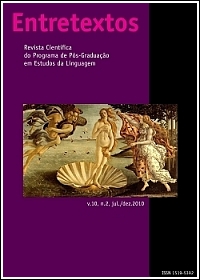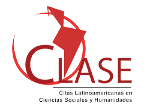The influence of Arabic on Brazilian Portuguese: the contribution of African slaves and the Lebanese immigration
DOI:
https://doi.org/10.5433/1519-5392.2010v10n2p5Keywords:
Languages in Contact, Arabic, InterferenceAbstract
The relationship between Arabic and Portuguese in Brazil is seen beginning with two distinct historical moments. The first phase took place during the eighteenth and nineteenth centuries, when the slave trade introduced an African muslim population into the Brazilian slave society. The second occurred more recently, with the flow of immigrants from Syria and Lebanon, starting in the late nineteenth century, establishing a new stage in the history of interactions between two languages. The present article presents the Arabic words exchanged between the two languages as well as semantic fields in which they organize themselves, as evidence of areas in which they observe the interactions between the contact of these two linguistic communities. Theoretical and methodological purposes, find refuge in the Sociolinguistics of language contact, introduced by Weinreich (1953) and became itself as a work source Vocabulary of Arabic origin, systematized by Vargens (2006). There are twenty-five words introduced by African slaves in the semantic field 'religion,' and twelve words in the semantic field 'cooking,' made possible by the presence of Syrian and Lebanese immigrants in this country.Downloads
References
ANDRADE, Carlos Drumond de. Poesia e prosa. Rio de Janeiro: Nova Aguilar, 1992.
CHEDIAK, Antônio. Aspectos da influência árabe na língua portuguesa. Revista da Liga dos estados árabes. Rio de Janeiro, 1972.
CORRIENTE, Frederico. Diccionário de arabismos y vocês afines em iberorromance. 2. ed. amp. Madrid: Gredos, 2003.
CORRIENTE, Frederico. Novedades en el estúdio de los arabismos em iberorromance. Revista Española, n. 26, v. 1, p. 1-13, 1996.
COUTINHO, Ismael de Lima. Pontos de gramática histórica. Rio de Janeiro: Ao Livro Técnico, 1976.
ELIA, Silvio. Preparação à linguística românica. Rio de Janeiro: Ao Livro Técnico, 2004.
FAULSTICH, Enilde. e CARVALHO, Elzamária Araújo Carvalho. Aspectos de herança da língua árabe na língua portuguesa: pontos de Terminologia. Revista Debate Terminológico, n. 2, jul., 2006.
FISHMAN, Joshua. The sociology of language. Ney York: House Publishers, 1972.
FREIRE, Gilberto. Casa-grande e senzala. Rio de Janeiro: Record, 1999.
GATTAZ, André. Do Líbano ao Brasil: história oral de imigrantes. São Paulo: Gandalf, 2005.
HOUAISS, Antônio. Línguas e a língua portuguesa. Francisco de Assis Barbosa (dir. e coord.). Revista do Brasil. Rio de Janeiro: Fundação Rio, 1990.
HOUAISS, Antônio. As Projeções da língua árabe na língua portuguesa. 1986. Disponível em: http://www.hottopos.com/collat7/houaiss.htm. Acesso em: 23 jun. 2008.
KNOWLTON, Clark. Sírios e libaneses: modalidade social e espacial. São Paulo: Anhambi, 1995.
MATTOS e SILVA, Virgínia Maria. Germanismos e arabismos no período formativo da língua. In: ECONTRO INTERNACIONAL DE ESTUDOS MEDIEVAIS DA ABRAEM, 5., Bahia, 2003.
MATTOSO CÂMARA, Joaquim. Dicionário de linguística e gramática. Petrótpolis: Vozes, 1978.
NIMER, Miguel. Influências orientais na língua portuguesa. São Paulo: Edusp, 2005. Resenha de VARGENS, J. B. M. Tiraz - Revista de Estudos Árabes e das culturas do Oriente Médio.
PIEL, Joseph Maria. Estudos de linguística histórica galego-portuguesa. Lisboa: Imprensa nacional - Casa da Moeda, 1989.
PESSOA DE CASTRO, Ieda. A matriz africana no Brasil. In: CARDOSO, Susana Alice Marcelino; MOTA, Jacira Andrade; SILVA, Rosa Virgínia Mattos, (Orgs.). Quinhentos anos de história linguística do Brasil. Salvador: Secretaria da Cultura e Turismo do Estado da Bahia, 2006.
REIS, João. Rebelião escrava no Brasil: a história do levante dos malês. São Paulo: Brasiliense, 1986.
RODRIGUES, Nina. Os africanos no Brasil. Rio de Janeiro: Nacional, 1933.
SAFADY, Jorge. A imigração árabe no Brasil: 1880-1970. São Paulo: Garatuja, 1994.
SILVA NETO, Serafim da. História da língua portuguesa. Rio de janeiro: Presença, 1988.
SILVA, José Pereira. Contribuição árabe na formação do português: vocabulário português legado pelos árabes. Philologus, Rio de Janeiro, v. 1996a, p. 143- 187.
SILVA, José Pereira. Contribuição árabe na formação do português. Philologus, v. 5, 1996b, p. 74-83.
TRUZZI, Oswaldo. Patrícios: sírios e libaneses em São Paulo. São Paulo: Hucitec, 1997.
VARGENS, João Batista. Léxico português de origem árabe: subsídios para os estudos de filologia. Rio de Janeiro: Almadena, 2007.
VASCONCELOS, Carolina Michaëlis de. Lições de filologia portuguesa. Revista de Portugal, 1956.
Downloads
Published
How to Cite
Issue
Section
License
Copyright (c) 2010 Entretextos

This work is licensed under a Creative Commons Attribution 4.0 International License.
Entretextos adota a Licença Creative Commons Attribution 4.0 International, portanto, os direitos autorais relativos aos artigos publicados são do/s autor/es.
Sob essa licença é possível: Compartilhar - copiar e redistribuir o material em qualquer suporte ou formato. Adaptar - remixar, transformar, e criar a partir do material, atribuindo o devido crédito e prover um link para a licença e indicar se mudanças foram feitas.
























